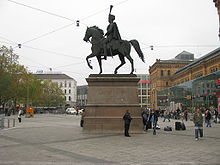Ernest Augustus I of Hanover
- Birth Date:
- 05.06.1771
- Death date:
- 18.11.1851
- Length of life:
- 80
- Days since birth:
- 92367
- Years since birth:
- 252
- Days since death:
- 62981
- Years since death:
- 172
- Extra names:
- Ernst August I., Ernsts Augusts I, Эрнст Август I, Ernst August I
- Categories:
- King
- Nationality:
- english
- Cemetery:
- Set cemetery
Ernest Augustus I (5 June 1771 – 18 November 1851) was King of Hanover from 20 June 1837 until his death. He was the fifth son and eighth child of George III, who reigned in both the United Kingdom and Hanover. As a fifth son, initially Ernest seemed unlikely to become a monarch, but Salic Law, which barred women from the succession, applied in Hanover and none of his older brothers had legitimate male issue. Therefore, he became King of Hanover when his niece, Victoria, became Queen of the United Kingdom, ending the personal union between Britain and Hanover that had existed since 1714.
Ernest was born in England, but was sent to Hanover in his adolescence for his education and military training. While serving with Hanoverian forces in Wallonia against Revolutionary France, he received a disfiguring facial wound. In 1799, he was created Duke of Cumberland and Teviotdale. Although his 1815 marriage to the twice-widowed Frederica of Mecklenburg-Strelitz met with the disapproval of his mother, Queen Charlotte, it proved a happy relationship. By 1817, King George III had only one legitimate grandchild, Princess Charlotte of Wales, and when she died in childbirth, Ernest was the senior son to be both married and not estranged from his wife. This gave him some prospect of succeeding to the British throne. However, both of his unmarried older brothers quickly married, and King George's fourth son, Edward, Duke of Kent, fathered the eventual British heir, Princess Victoria of Kent (later Queen Victoria).
Ernest was active in the House of Lords, where he maintained an extremely conservative record. There were persistent allegations (reportedly spread by his political foes) that he had murdered his valet and had fathered a son by his sister, Princess Sophia of the United Kingdom. Before Victoria succeeded to the British Throne, it was rumoured that Ernest intended to murder her and take the Throne himself. When King William IV died on 20 June 1837, Ernest ascended the Hanoverian Throne. Hanover's first ruler to reside in the kingdom since George I, he had a generally successful fourteen-year reign, but excited controversy when he dismissed the Göttingen Seven (including the two Brothers Grimm) from their professorial positions for agitating against his policies.
Later life, death, and memorial

Statue of Ernest Augustus I in front of the Hannover Hauptbahnhof. Bystanders meet "under the tail".
In 1851, the King undertook a number of journeys around Germany. He accepted an invitation from the Prussian Queen-consort to visit Charlottenburg Palace, near Berlin. He visited Mecklenburg for the christening of the Grand Duke's son, and Lüneburg to inspect his old regiment. In June Ernest celebrated his 80th birthday by playing host to the King of Prussia. Late that summer, he visited Göttingen, where he opened a new hospital and was given a torchlight procession.
The King continued his interest in British affairs, and wrote to Lord Strangford about the Great Exhibition of 1851:
The folly and absurdity of the Queen in allowing this trumpery must strike every sensible and well-thinking mind, and I am astonished the ministers themselves do not insist on her at least going to Osborne during the Exhibition, as no human being can possibly answer for what may occur on the occasion. The idea ... must shock every honest and well-meaning Englishman. But it seems everything is conspiring to lower us in the eyes of Europe.
The King died on 18 November 1851 after an illness of about a month. He was mourned greatly in Hanover; less so in England where The Times omitted the customary black border to its front page and claimed "the good that can be said of the Royal dead is little or none." Both he and Queen Frederica rest in a mausoleum in the Herrenhausen Gardens.
A large equestrian statue of King Ernest Augustus may be found in a square named after him in front of Hanover Central Station, inscribed with his name and the words (in German) "To the father of the nation from his loyal people." It is a popular meeting place; in the local phrase, people arrange to meet unterm Schwanz or "under the tail" (that is, of the horse which the King rides).
Although The Times denigrated Ernest's career as Duke of Cumberland, it did speak well of his time as King of Hanover, and of his success in keeping Hanover stable in 1848:
Above all, he possessed a resolute decision of character, which, however unfortunately it may have operated under different conditions, appeared to extraordinary advantage at the crisis of continental thrones. Bewildered by the revolutionary din, and oscillating ignominiously between fear and rage, resistance and concession, the clique of crowned heads suffered greatly by contrast with a Sovereign who at least knew his own mind, and was prepared to abide by his opinions. In the European convulsions, therefore, King Ernest maintained the stability of his throne and the tranquillity of his people without damage from revolution or reaction. As Kings, indeed, are computed on the continent, he was an able and even a popular Monarch, and his memory may find, perhaps, in his ancestral dominions a sympathy which it would be vain to bespeak for it in the scenes of his manhood or the land of his birth.
Source: wikipedia.org
No places

No relations set
No events set



